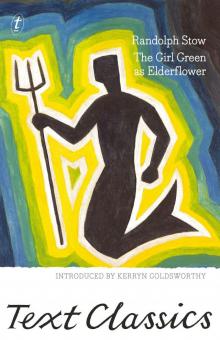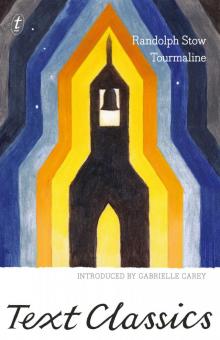- Home
- Randolph Stow
To the Islands Page 9
To the Islands Read online
Page 9
Justin came over and dumped his blankets and bags, went back and unsaddled. Heriot said nothing, had no direction to give, was willing to be managed by Justin for the rest of his life. He watched the broad face of the man bent over his bundles.
‘I brought hopples, too,’ Justin said proudly. ‘Out of you office.’ He held up the hobble chains and jingled them.
‘Good,’ Heriot murmured.
The white teeth grinned, and the man rose and went to the horses, leading them down to the edge of the water where there was a bank of silt. When he came back Heriot had not moved, still held the rifle clutched to his chest. ‘You like you tucker now, brother?’ he asked.
‘No,’ Heriot said, wearily. ‘I’m not hungry.’
‘I make a fire and we have a cup of tea, eh?’
‘If you like.’
He watched the dark figure gathering wood and piling it, and tossed his box of matches when Justin’s hands demanded. As the wood crackled, the light came like an explosion, hurting his eyes, so that he turned and looked at the flame-washed rock behind him, patterned with the ochre and charcoal drawings of natives. He saw rock wallabies, crocodiles, goannas, little priapic men. Recurrent everywhere was the symbol of lumiri, the rainbow serpent.
‘Is this place sacred?’ he asked dully.
‘No. Plenty old people camp here. Women, too.’
‘Lumiri can take you to the sky, is that right?’
‘Might be,’ Justin said noncommittally, crouched over his fire.
Heriot stood up, spread out his blanket and lay down on it, the rifle beside him, he whistled two notes, and the cliffs threw them back clear and pure. He executed a brief phrase and received it back again. With a kind of desperate concentration he applied himself, to composing a duet for his whistle and the echo, involving a pleasant use of counterpoint.
Later, when the quart-pot boiled, he sat propped on one elbow and drank tea, and then lay down again by his rifle. Justin came and spread his blanket and lay beside him, listening to the white man’s slow breathing. At last he said: ‘Brother?’
‘Yes?’
‘I take that gun away if you sleepy.’
‘No. Leave it.’
‘Brother—’
‘Yes?’
‘You going to say prayer?’
A strange tearing noise came back from the cliffs. The horses, down at the edge of the dark water, were drinking.
‘I know a prayer,’ Heriot said into his blanket. ‘A very old prayer.’ He whispered it to the ground.
‘Fittingly is now my coming
Into this world with tears and cry;
Little and poor is my having,
Brittle and soon y-fallen from high;
Sharp and strong is my dying,
I ne wot whither shall I;
Foul and stinking is my rotting—
On me, Jesu, thou have mercy.’
The rain shattered on the roof with tireless tropical zeal, eager to have the job done and over, violently intent. If it could deliver three inches in an hour or two, that would be raining, it could rest then until the morning.
Dixon, rising wet and gasping from the darkness like a fish, fetched up at the hospital door and leaned in, looking for Helen, who was marooned on an island of lamplight in a dark room. In the shadow, vaguely, he could see the humped whiteness of Rex’s bed. She had put out the electric light and sat removed from him, reading from a solid blue book.
‘Helen,’ he whispered to her.
She looked up, not seeing him at first, then came quietly out with her book to the veranda. The iron roof roared with rain.
‘Is something wrong, Terry?’
‘No—least, I hope not. You seen Heriot?’
‘Not all day.’
‘I took your telegram over there to send to the doctor, but it was too late for the sched, and the old man wasn’t there. I felt the wireless and it was cold. I don’t think he listened in.’
‘Is it working?’
‘I’ll check up later. The thing is, he wasn’t at church either. Ways haven’t seen him, nor’s anyone else, and when I went over to his house his bed had been pulled to bits and the blankets taken. Looked like he’d shot through.’
She was deeply silent. ‘Well,’ he asked, ‘aren’t you surprised?’
‘Terry—I don’t know anything.’
‘Where would he go, on a day like this? Any day, come to that.’
‘I don’t know,’ she said.
‘Aren’t you scared he might have been knocked down by something, like Rex was? I am.’
She was clutching her book unhappily to herself as Gunn came leaping and dripping on to the veranda. ‘The Wet’s over,’ he said bitterly. ‘Get an eyeful of the Dry.’
‘You seen Heriot?’ Dixon asked.
Gunn shook his head with a shower of drops, and the silence came down on them again. ‘Come into the dispensary,’ Helen said, to break it.
The yellow-lit room was airless, a feeling of damp lay on chairs and table and skin, and moths were mad with light. ‘Better out there, really,’ Gunn said.
Dixon wiped his face. ‘Well, what are we going to do about the old man? Can’t just forget about him.’
Gunn said: ‘You knew he’d gone, didn’t you, Helen?’
‘Yes, I went to his office, and then to his house. I noticed the same things Terry noticed.’
‘Anything else? You’re probably more observant than we are.’
She hesitated. ‘Yes,’ she said finally. ‘The top rifle from the rack in the office was gone. It’s always been there. Always.’
Dixon’s puzzled eyes went from her to Gunn, who had stiffened in his chair. ‘What is all this?’ he asked loudly. ‘What’s the secret?’
Gunn said quietly and quickly: ‘Just a minute, Terry, we’re working things out. You cleaned the wound, Helen. The one on the forehead.’
‘Yes.’
‘What was it like?’
‘Ragged,’ she said. ‘Fairly deep.’
Dixon shifted impatiently. ‘So what?’
‘It wasn’t the iron,’ Gunn said. ‘Couldn’t have been. It didn’t look right to begin with. If the wind was strong enough to carry it on so far after hitting him it would have carried it over his head in the first place. And the wound didn’t look right either, as far as you could see it. If the iron had hit him flat on you’d expect his nose to be broken and not so much blood on the forehead. And if it had hit him with a corner or edge—well, God knows what it would have done, but it would have been worse than it was.’
‘It was a stone,’ Helen said flatly. ‘I’m sure of it.’
Dixon said abruptly: ‘I get what you mean.’
They turned to him, astonished by the change in his voice, his face. No longer an awkward, good-natured man to whom it was not necessary to pay attention, he had hardened and grown and taken on an air of sardonic decision.
Helen said: ‘But we don’t know, Terry...’
‘You’ve got no doubts about it. That old—he tried to kill Rex and then went out and shot himself.’
‘We can’t be sure,’ Gunn protested. ‘We could be wrong about the wound.’
‘Just because he hated Rex.’
‘He was a good man,’ Helen said sharply.
‘Ah, a good man, all right. At least he knew what he ought to get for it.’
Over the sound of rain: ‘Terry,’ Helen cried out, ‘you must listen to us. He wasn’t a bad man. If he tried to kill Rex, it wouldn’t have been because he hated him, it would have been because he thought the mission was in danger from him.’
‘He might have kidded himself.’
‘Terry, you believe in God.’
‘Yeah.’
‘If you could bring people back from death, would you refuse?’
He looked at her with his farseeing eyes. ‘No.’
‘We’ve saved Rex. But I can’t save Mr Heriot, you and Bob are the only ones who can do that.’
‘Not if he’s s
hot himself.’
‘But he took blankets, he can’t have meant to do it straightaway, if he meant it at all. There’s always a chance, Terry—’
‘But he tried to kill someone. He doesn’t deserve being saved.’
She had the thick medical book held tightly in her lap, and her voice went on, quickly and passionately in the stifling room: ‘I don’t believe in heaven and hell, but I believe in sin, and sins that aren’t wiped out on the earth stay on the earth forever echoing and echoing among the people left behind. We’re trying to wipe out the sin of the white men who massacred these people’s relations, but we can’t ever quite do it, because we’re not the same white men. And Mr Heriot has to come back, he’s the only one who can wipe out his hatred of Rex. They’ll come to see that as hating and rejecting all of them.’
She stopped then, looking down at her hands, and Gunn broke in quietly. ‘We drive people to it,’ he said. ‘The white men at the massacre thought they were protecting property, and Mr Heriot thought he was protecting the mission. Things we asked them to protect. We can pay reparations to people we hurt in our wars, but we don’t ever quite pay back the people we force to hurt them. But with Heriot we can try, Terry, or I will. All you need to do is keep quiet about it, now you know everything.’
Dixon rubbed his hands on his knees, his head bent. ‘You can talk,’ he said. ‘Both of you.’
‘Two people have killed one another,’ Helen said, ‘but we have this chance to bring them back and reconcile them. That’s heaven. But if we fail, their hate will go on spreading and growing forever, and that’s hell, Terry.’
‘I believe you,’ he said at last. ‘What do you want me to do?’
‘Don’t let anyone know about Rex, let them think it was the iron. No one else will see the wound.’
‘Aren’t you going to get the doctor plane for him?’
‘He’s out of danger, and the airstrip’s unserviceable. It’ll be a marsh after this rain.’
‘How do we stop Father Way from working out why Heriot’s shot off?’
‘They had a quarrel this morning, Mrs Way told me a little bit she heard of it from him. It’d be easy for me to convince him Mr Heriot was on the verge of suicide.’
‘And where do we look for him?’ Dixon asked.
Gunn said: ‘I’d pick Onmalmeri.’
‘Where the ghosts are?’
‘He often said he thought it was beautiful, and how he wished he had a few days to ride out and camp there.’
Helen said softly: ‘He once told me he’d like to be buried at Onmalmeri. He loathed the cemetery here.’
‘I’ll go there,’ Dixon said. ‘One last thing—what about Rex?’
‘Helen will talk to him,’ Gunn muttered restlessly.
Helen stood up and went to the table and laid her book down there. ‘I might as well tell you,’ she said, leaning over it, her back to them, ‘what I’m going to do.’
‘Well, tell us.’
‘I don’t know if you’ve thought of it, but Rex, when he wakes up, probably won’t remember anything. Retroactive amnesia.’
She felt their faint movements of relief and surprise.
‘Well,’ said Dixon, ‘that’d be a break. That’d be apples, that would.’
‘But I’d tell him,’ she said.
5
Way said: ‘I still find it incredible. Utterly.’
‘He wasn’t well,’ Helen said. She was tired, and sat hugging her knees on the edge of his veranda, with the drowsy scent of frangipani close above her head. ‘I’ve been afraid of—not this, exactly, but some sort of breakdown. I think we’re right to fear—well, the worst.’
In his jungle-garden finches haunted the dark green of the poincianas, the frangipanis, the creepers, fluttering restless as butterflies round the dripping leaves. ‘But to take Justin...’
‘I don’t know why he should have done that. It’s all much more puzzling now than it was last night, before we knew Justin had gone. But it’s more hopeful, if there’s someone with him.’
‘Of course, there’s not much chance of finding tracks, after this wind and rain. Why do you feel so certain he went to Onmalmeri?’
‘I don’t feel certain, father. But he often said he loved the place, and it had—associations. You remember?’ she asked, unable to add, since he knew so little: It is where the murdered people are, the murdered.
Mrs Way, cradled by a deck-chair in the tendrilled shade of her veranda, clicked with her morning tea-cup. ‘Poor Mr Heriot,’ she said sadly. She was a lean, grey Englishwoman, kindly and calm.
Helen said to the garden: ‘It needn’t be too late, it needn’t. Don’t you believe Terry will find him?’
‘I only hope,’ Mrs Way confessed. ‘This country—so vast...’
‘He must be at Onmalmeri. If he isn’t, Terry will have wasted nearly two days. If only Justin had told someone—’
‘He didn’t,’ Way said. ‘Ella and Stephen can’t remember when exactly he left the house. But he took his spears some time before going away, so it sounds as though he meant to make a long trip.’
‘You didn’t tell me that, dear,’ said Mrs Way. ‘Now I feel much more optimistic. Perhaps Mr Heriot, not being quite—stable, thought a long journey through the bush would be good for him.’
‘We can’t be sure of anything, of course. That’s why I don’t want to report his disappearance until we’ve done as much as we can to find him. But I’ll have to, if he’s not at Onmalmeri. He could hardly object, even if he chose to be lost—with two of the best of our wretched little handful of horses, incidentally.’
‘I don’t think you need be cross with him yet,’ Helen said quietly.
‘I’m sorry, Helen. I still find the whole thing hard to believe.’
Across the road Harris clanked a few notes on the bell, bringing Helen to her feet. ‘Thank you, Mrs Way. I must go to the store, and then back to Rex.’
‘Are you pleased with him, Helen?’
‘Oh, yes, fairly. It will take time.’
‘Such bad luck he has, poor man. First his wife, and now this.’
‘Yes,’ Helen said, ‘very bad luck. But he’ll survive this, with that hard head of his. I must go.’
Inside the store Harris, free of customers and glad to talk to someone, stood rolling a cigarette. He looked up and smiled at her with his old, dry face. ‘Out of smokes?’
‘Yes,’ she said. ‘Can you see me craving?’
He reached for a packet and entered it in his book. ‘I reckon you smoke more than you earn. Should roll ’em.’
‘I think I will from now on.’
‘Three and a half inches we’ve had. That’s raining.’
‘But it seems to be over,’ she said, looking through the door at the bright sunlight. ‘I hate it like this, just after the sun comes out.’
‘It’s sticky, all right.’
‘Harry,’ she asked, lighting a cigarette, ‘what do you think about this—about Mr Heriot? We never hear your opinion of anything.’
He had his spidery elbows on the counter and his chin in his hands, staring outside. ‘I don’t know. I’m just wondering, like everyone.’
‘Do you think he would—well, kill himself?’
‘Might. You hear of that sort of thing happening.’
‘What, here?’
‘Well, there was one, not on the staff, but doing a job here. Good few years ago. You take an old man like Heriot, just going to leave the place and not knowing anywhere else much—he might do it.’
‘But having Justin with him—wouldn’t that stop him?’
‘No. If he asked Justin to come with him, that’d mean he wasn’t up to anything, but if Justin went after him to bring him back he’d do what he was going to do and tell Justin to get out of the way. It’d annoy him, being followed like that.’
‘You’re very resigned,’ she said hopelessly. ‘I couldn’t be.’ Like him she stared out at the warm, damp sunlight towards which the smoke
from their cigarettes was slowly tending, climbing up and out in peaceful ripples. ‘But Terry will be at Onmalmeri late this afternoon, and he will be there, Harry, he must be.’
It was mid-afternoon when Dixon arrived at Onmalmeri. After the long day’s ride over rocky hills, through man-high canegrass studded with little broad-leaved trees, the gan, the wild orange, the wild kapok; after the river flowing shallowly over rock and the ascent to new hills from which one looked down on islands of dense pandanus and cliffs burning red in the light or dull in shadow; after great distances of earth bared by old fires, and sudden cool clumps of gums, and the inescapable rock in boulders and floors and cliffs, he came on a new river, and across the river the cliff of Onmalmeri thrust up from its dark pool.
There was a bird which he had never seen but which he hated savagely, it was there now in the trees or hidden in the pandanus, making its sound like a baby’s crying and answering itself with a madwoman’s laugh.
Stephen and Gregory were with him and followed him when he dismounted and went down to the water. He lay on his stomach over a flat rock and drank, and sat up again and looked across the pool at the cliff. Galleries ran along it at water level, but above, it was a vast crumbling wall, crazily built of square chunks of rock, coming out in sudden corners edged with red light or bending away into shadow. Pandanus grew at water level in one of its inlets, bright green against the red rock, and trees and spinifex sprouted from its high crannies, or at its top, hundreds of feet above, stretched out against the sky. From across the shadowy pool came to him the low, slow lap of water and a sudden crack of sound as two rock pigeons burst from their shelter far above.
‘We’ll have to go on foot,’ he said, ‘up and down the pool and all around, looking for them.’
‘More better, brother.’
‘You go that way, Gregory. It won’t take you long. Fix up the horses and make us a cup of tea for when we get back, it’ll take us a while.’
‘I do that,’ Gregory said.
Dixon stood up. He would have liked to stay longer in that green coolness under the rustling pandanus, but he said: ‘Come on, Stephen,’ and began rapidly walking away, pushing through the densely growing trees, tearing aside curtains of creeper. The insane bird persevered with its hysterics somewhere among leaves.

 The Girl Green as Elderflower
The Girl Green as Elderflower Tourmaline
Tourmaline Visitants
Visitants To the Islands
To the Islands The Suburbs of Hell
The Suburbs of Hell